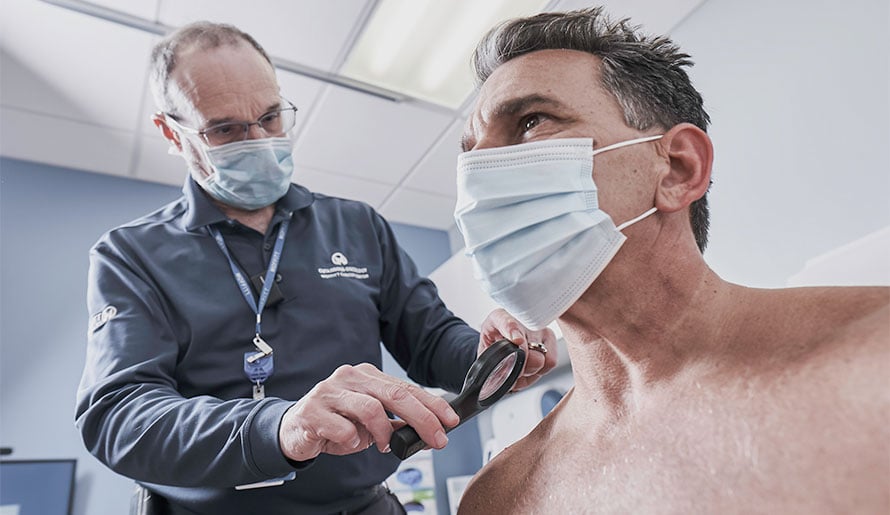Causes and Risk Factors of Skin Cancer
Unlike many other types of cancer, nonmelanoma skin cancers often become noticeable simply because of their unusual appearance or failure to heal properly. In fact, more than 75% of nonmelanoma skin cancer diagnoses begin with patients or their family members noticing an unusual skin growth or discoloration and bringing it to a physician’s attention. Therefore, it’s a good idea to be familiar with skin cancer symptoms so you can be ready to report any developments on your skin that may be warning signs of cancer.
Whether you’re seeking an initial medical consultation or have already received a nonmelanoma skin cancer diagnosis, you can visit Moffitt Cancer Center without a referral. Our Cutaneous Oncology Program offers the most advanced diagnostic procedures, including lymphoscintigraphy (lymphatic mapping) and sentinel node biopsy. And our highly experienced skin cancer specialists stand ready to review any previous biopsies, lab work and scans you may have received to provide you with a second opinion.

Diagnostic testing for skin cancer
After reviewing your medical history and conducting a physical exam, your physician may perform a biopsy to make the diagnosis. A biopsy, typically performed in a dermatologist’s office or outpatient clinic, involves the surgical removal of a small amount of tissue for examination under a microscope. It’s usually the only testing needed for an accurate diagnosis as well as determining the stage of any nonmelanoma skin cancer that’s confirmed. Another plus: Biopsies can often remove the skin cancer entirely so that no further treatment is required.
For this procedure, you’ll likely receive a local anesthetic to numb the biopsy area. Then your physician will remove the skin lesion that’s suspected of being cancerous and a small area around it, which is called the margin, for testing.
Laboratory testing to detect nonmelanoma skin cancer
Once the suspicious skin lesion has been collected, it will undergo lab testing and analysis by a dermapathologist who specializes in evaluating skin cells and adjacent tissue for the presence of cancer. If lab testing detects cancer in the biopsied area but indicates it was entirely removed, no further treatment is usually required.
There are several different skin biopsy methods, and your physician will choose one based on factors such as the suspected type of skin cancer, its size, where it’s located on your body and your concerns about scarring. Some of the most common skin cancer biopsy techniques include:
- Shave biopsy – Also known as a tangential biopsy, this method uses a sharp, sterile blade to “shave off” the growth. It’s typically selected when the dermatologist suspects that a cancerous tumor involves only the top layer of skin, but the blade may be angled to collect a portion of the second layer of skin.
- Punch biopsy – This technique uses an instrument that resembles a cookie-cutter to remove a circle of tissue from the area that appears abnormal. It’s performed when cancer cells are suspected of extending more deeply into the skin, and suturing is planned.
- Incisional biopsy – A scalpel is used to remove only part of the skin abnormality for lab testing. This method is often chosen when a skin lesion is large and total removal would result in a sizable wound.
- Excisional biopsy – A scalpel is used to remove the entire growth as well as some of the tissue surrounding it.
No matter which biopsy technique is selected, the tissue sample will be evaluated under a microscope, and dermatopathologists will then determine whether there’s a skin cancer diagnosis. Your physician will receive the test results and discuss them with you, as well as advise you of the next steps you should take. For example, some patients require further testing and treatment if their biopsy reveals cancer cells at the edges of the tissue that was removed.
Imaging tests seldom required for nonmelanoma skin cancer diagnosis
Nonmelanoma skin cancer is less likely to spread than melanoma, so imaging scans are rarely required to check lymph nodes and other organs for signs of cancer. However, in rare cases of aggressive nonmelanoma skin cancer, imaging tests may be used to determine whether and how far the cancer has spread.
In recent years, the use of dermoscopy has been expanding as a diagnostic tool for all types of skin cancer, including nonmelanoma tumors. Using a handheld imaging device called a dermatoscope, physicians can use light and magnification to view details that would not be visible to the naked eye.
Skin cancer specialists can also use lymphoscintigraphy to check for signs that cancer has spread to the lymph nodes. This diagnostic tool involves injecting a radioactive substance into the body and tracking its flow using a scanner and a computer screen. This method is used to identify the sentinel lymph node, which is the first node to receive lymph from a tumor. The sentinel lymph node is then removed and checked for cancer cells.
How Moffitt Excels at Nonmelanoma Skin Cancer Diagnosis
At Moffitt Cancer Center, our multispecialty skin cancer team collaborates on every case, ensuring that a diagnosis is made by not just one but several professionals across all specialties. If further treatment is required, the entire team will work together to create an individualized plan for each patient. Moreover, as one of the top cancer hospitals in the nation, Moffitt has specialists with extensive experience in treating even the most uncommon and aggressive types of skin cancer.
If you’re seeking a skin cancer diagnosis or would like a second look at previously received diagnostic work, call Moffitt at 1-888-663-3488, or complete our new patient registration form online. When cancer is suspected or has been diagnosed, every day counts. Referrals are not required to visit Moffitt.
References
American Society of Clinical Oncology – Skin Cancer (Nonmelanoma): Diagnosis
American Cancer Society – Tests for Basal and Squamous Cell Skin Cancers
Diagnosis
